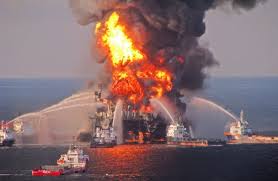
Did Obama Forget the BP Oil Spill?

The administration swore it would profit from the mistakes of the 2010 Gulf oil spill. The decision to allow drilling in the Atlantic makes you wonder if it learned anything at all.
After a brief flurry of positive news for environmentalists out of the Obama White House—from a deal with China on reducing greenhouse-gas emissions to a plan to restrict oil drilling in the Alaska wilderness—a news report this week felt like something of a slap in the face: The administration plans to allow offshore oil and gas drilling in the Atlantic Ocean from Virginia to Georgia, beginning two years from now.
The move satisfies a long-held desire by many GOP members of Congress, who’d been pushing hard for this big expansion as President Obama’s Interior Department works on a five-year offshore drilling permitting plan that will run from 2017 through 2022. And there had been warning signs that the president would give them what they sought; in July, the administration signed off on oil companies using 250-decibel seismic guns to map the Continental Shelf from Delaware to Florida—despite warnings that the blasts will deafen and even kill marine mammals, interfering with their communications and breeding.
As a native son of Louisiana, I’m deeply troubled by Obama’s move. I’ve been an environmental lawyer along the Gulf Coast for a quarter-century. For the last four years, most of my work has been representing fishing boat captains or small business owners whose lives have been turned upside down by the worst offshore drilling disaster in U.S. history: the 5 million barrels of oil that spewed forth from BP’s Deepwater Horizon blowout. I’ve listened to the clean-up workers coping with headaches, nausea, and other ailments from breathing in crude oil or the toxic dispersant used to make the oil “disappear” from the surface of the Gulf. I honestly don’t think America can handle another drilling disaster of the BP magnitude.
So how can we move forward on Atlantic drilling when the government has not followed through on its promises to learn from the mistakes that caused the Gulf oil disaster? In 2011, the National Oil Spill Commission—created in response to the BP fiasco—recommended a series of measures that would be funded through the industry’s lease payments and would place a much greater emphasis on safety. For example, it called for a new “Safety Institute” that would study and implement ways to prevent future accidents. Remarkably, none of the commission’s proposals have been funded or implemented. Indeed, there has been no new federal legislation to improve offshore drilling standards since the calamity along the Gulf Coast … none!
This summer, the Interior Department put another 21 million acres in the western Gulf of Mexico up for lease.
